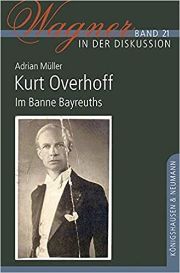An explosive story
In his dissertation "Kurt Overhoff - Im Banne Bayreuths", Adrian Müller proves that the piano concertos by Kurt Leimer were in fact composed by Overhoff.

Kurt Overhoff was the teacher of Wieland Wagner, the founder of the "Neubayreuther" uprising in 1951, that is well known. In his dissertation, Adrian Müller makes clear what else is hidden behind this name. He has painstakingly traced Overhoff's life and work and brought to light the tragic fate of a highly talented musician. His arguments are very restrained, which is probably due to the fact that this is an academic work. Even the title is ambiguous, as neither Winifred Wagner, who brought Overhoff to Bayreuth, nor Wieland Wagner, who mercilessly sent his mentor "into the desert" after 1951, are seen in a good light. "Under the spell of Bayreuth" seems somewhat harmless.
Kurt Overhoff was born in Vienna in 1902. The young man soon turned out to be a highly talented musician and composer, whose opera Mira, in the tradition of Richard Strauss, achieved considerable success in Essen in 1925. In 1931, he was appointed music director in Heidelberg, where he premiered his own works and broke new ground with his lecture concerts. His fateful year was to be 1939, when he was admitted to the Kennenburg psychiatric clinic after a breakdown and sedated with a cocktail of drugs. The background to his internment cannot be determined exactly, but it was probably due to the fact that Overhoff was considered "of Jewish descent" in Nazi jargon.
It was Winifred Wagner who brought him to Bayreuth a year later, albeit after an intrigue that had prevented Overhoff's return to Heidelberg. From then on, he was to serve the heir to Bayreuth, which he did faithfully until 1951. According to Müller's research, many of Wieland's revolutionary staging ideas had their origins in Overhoff's methods of analysis, which Wieland had been able to try out at the Landestheater Altenburg from 1943 under the guidance of his teacher. After being banished from the "Green Hill" in 1951, Overhoff, who had since married, was no longer able to find employment due to his psychiatric past and rumors (which were probably deliberately spread).
However, the stranded man had to earn money somehow to feed his family, so he hired himself out as a composing ghostwriter to the famous pianist Kurt Leimer. Leimer wrote four piano concertos, all four of which were enthusiastically recorded and issued by the EMI record company. They were premiered by Herbert von Karajan and Leopold Stokowski in Berlin and New York - followed by tours.
Leimer had always contributed the piano part as a specification, but he had no idea about the overall composition, which is why he quickly became embarrassed when asked. And so he even took the real composer Overhoff, disguised as a servant, on tour with him so that he could "brief" him in the background on any technical questions the conductor might have.
It is a scandalous case of fraud that Müller has uncovered and which reveals an unimaginably tragic fate. Incidentally, Leimer's estate is in the Zurich Central Library, and Overhoff is not mentioned at all on the Leimer Foundation's website.
Adrian Müller: Kurt Overhoff - Im Banne Bayreuths, (Wagner in der Diskussion, vol. 21), 512 p., € 48.00, Königshausen und Neumann, Würzburg 2020, ISBN 978-3-8260-7095-2








